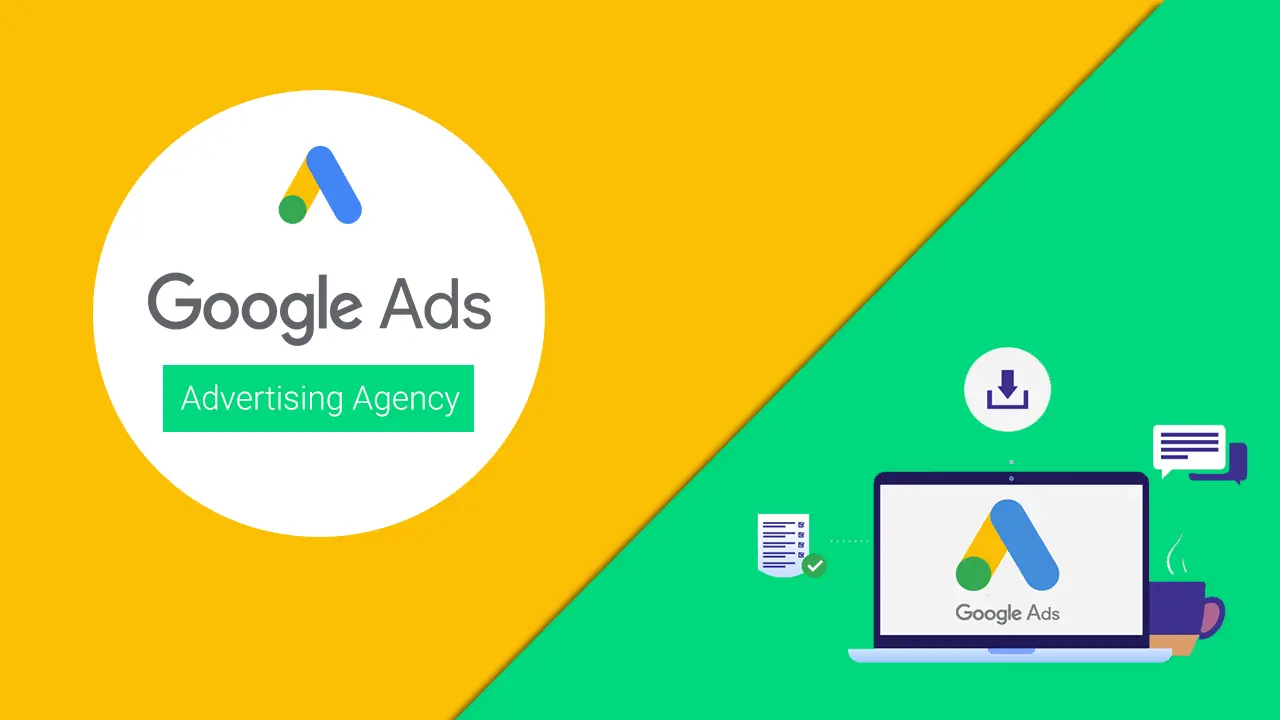Google Advertising Agency
Do you want to take your business to the next level using Google Ads? Are you struggling to find the right keywords and target audience for your advertisements?
Look no further! As a top Google advertising agency, we are here to help you achieve your marketing goals.
With our team of skilled professionals, we can create and manage effective campaigns that will increase your online visibility and drive traffic to your website.
In this blog, we will cover everything from the basics of Google Ads to advanced strategies for optimizing your ad performance.
Let’s get started on taking your business to new heights with the power of Google Ads!

1. Introduction to Google Advertising
Hey there reader! I’m excited to introduce you to the world of Google advertising. As a Google advertising agency, we know the ins and outs of this powerful advertising platform. But first, let’s start with the basics.
Google Advertising is a way to promote your business on the world’s most popular search engine.
With Google Ads, you can create highly targeted ads that reach potential customers who are actively searching for products or services like yours. You only pay when someone clicks on your ad, which makes it a cost-effective way to drive traffic and sales to your website.
But to make the most of Google advertising, you need to understand the role of keywords in SEO.
Keywords are the words or phrases people use to search on Google. By targeting the right keywords in your ads, you can reach the right audience and increase your chances of conversion.
To find the right keywords, you need a keyword research tool. This tool helps you identify the search terms your potential customers are using.
Once you have your list of keywords, it’s important to manage them in your Google Ads account to ensure you’re targeting the right ones and not wasting money on irrelevant clicks.
Understanding different match types for keywords is also crucial. Broad match, phrase match, and exact match all have different levels of targeting, so it’s important to choose the right one for your goals.
Lastly, as a Google advertising agency, we know the importance of staying up-to-date with industry trends and best practices.
That’s why we also cover other topics such as research writing, accounting, and cyber security to provide a well-rounded experience for our clients.
Thanks for reading and stay tuned for more informative content!

2. What Are Keywords and Their Role in SEO?
- Keywords are a vital part of SEO because they help search engines understand the context and relevance of your content to a searcher’s query.
3. Keyword research tools help in identifying the words and phrases that users search for in order to optimize your content for better visibility.
4. Managing keywords in your Google Ads account can improve the cost-effectiveness of your campaign by ensuring it targets the right audience.
5. Different match types for keywords allow you to control how closely a search query matches your chosen keyword, ensuring the right audience sees your content.
6. As a writer, understanding the different research sections in academic writing can help you identify the right keywords to use.
7. A clear research purpose and statement/intent can also help in identifying targeted keywords for your writing.
8. Different cost categories in accounting can also be optimized with targeted keywords to drive relevant traffic to your business or service.
9. Cyber security is a growing concern, and optimizing relevant keywords in your content can help establish authority and trust with users looking for information on the topic.
10. Lastly, a well-optimized human rights complaints procedure and mechanisms of allegation can help users access the necessary resources and support they need during a difficult time. Optimizing the right keywords can ensure that your content reaches those seeking it in a timely and effective manner.
3. Importance of Keyword Research Tool in Advertising
As a Google advertising agency, we know that one of the most important aspects of running a successful ad campaign is choosing the right keywords. That’s why we always emphasize the importance of using a keyword research tool in our advertising strategy. Here are three reasons why every advertiser should utilize this tool:
- Find the right keywords: With a keyword research tool, you can identify the words and phrases that your potential customers are using when they search online.
By targeting these keywords in your ads, you’ll be able to reach the right audience at the right time, resulting in more clicks and conversions.
- Analyze keyword performance: A keyword research tool also allows you to analyze the performance of your chosen keywords. You can find out how often they’re searched for, how much competition there is for each keyword, and how much you can expect to pay for each click.
This information enables you to optimize your ad campaign for maximum ROI.
- Discover new keyword opportunities: Finally, a keyword research tool can help you discover new keyword opportunities that you may not have otherwise considered.
By exploring related keywords and long-tail phrases, you can expand the reach of your ad campaign and uncover new, untapped markets.
In conclusion, using a keyword research tool is crucial for any advertiser who wants to create a successful ad campaign.
By utilizing this tool, you can find the right keywords, analyze their performance, and discover new opportunities that can help you reach your business goals. So why not give it a try? Your ad campaign will thank you.

4. Tips for Managing Keywords in Google Ads Account
Hey there, fellow advertisers! I hope you’re enjoying our guide to Google Advertising so far. In this section, we’ll be discussing some essential tips for managing your keywords in your Google Ads account.
- Keep Your Keyword List Organized
It’s crucial to keep your keyword list organized to ensure that your campaigns are running efficiently.
You can organize your list by grouping similar keywords into ad groups to make it easier to track the performance of each campaign. Moreover, you should regularly review your list to exclude irrelevant keywords that could be hurting your ad performance.
- Use Negative Keywords
The use of negative keywords can help prevent your ad from showing up in irrelevant search queries. For example, if your ad is targeting “running shoes,” you may want to add negative keywords like “free shoes” or “used shoes” to prevent unwanted clicks.
- Focus on High-Performing Keywords
By analyzing your ad’s performance, you can identify which keywords are driving the most traffic and conversions. Focus on these high-performing keywords by dedicating more budget and ad copy to them while minimizing the impact of the lower-performing ones.
- Test Different Match Types
There are three match types: broad, phrase, and exact. Use all three match types in your campaigns and experiment with them to find the best performance for your business.
Each match type comes with its own level of customer intent, so one may be more effective than the others depending on your target audience and goals.
There you have it, folks! Our top tips for managing keywords in your Google Ads account. Keep these in mind and continuously optimize your campaigns for better performance. Happy advertising!
5. Understanding Different Match Types for Keywords
Hey there! As a Google advertising agency, we know the importance of understanding different match types for keywords in order to optimize ad campaigns.
Here’s a quick list of tips to help you manage keywords in your Google Ads account.
- Start with exact match keywords to narrow down your audience and ensure that your ad will only be shown to those searching for the exact phrase.
This will help ensure a high level of relevancy between the search query and your ad.
- Phrase match keywords offer an expandable range of relevant searches. Advertisers can use phrase match keywords to expand on exact match keywords and cover more ground without losing relevancy.
- Broad match keywords will show your ad to the widest audience possible by matching your ad to any search term remotely related to your keyword. This can be great for raising brand awareness, but could result in wasted ad spend on clicks who aren’t searching with the level of intent you’re targeting.
- Broad match modifier is a middle ground between broad and phrase match. By adding a plus sign ( ) in front of desired keywords, advertisers can specify which words must be included in a search to trigger their ad.
- Don’t forget to also consider negative match keywords to prevent your ad from showing for irrelevant search terms. This is especially important for broad match keywords that have the potential to attract unwanted traffic.
By keeping these different match types in mind, you can finely tune your ad targeting and maximize ROI. As a Google advertising agency, we’re here to help you get the most out of your ad campaigns. Happy optimizing!

6. Types of Research Sections in Academic Writing
As a professional content writer, I understand the importance of proper research and its impact on academic writing. In fact, research is the backbone of academic writing, and it has different sections that need to be addressed.
Here are some important types of research sections in academic writing you should know about:
- Introduction: This section introduces the topic of your research and gives a background on what your research is all about. It should also include the objective/purpose of your research.
- Literature review: This section highlights the relevant and current literature on the topic you are researching. It helps to contextualize your research and provides foundational knowledge on the topic.
- Methodology: In this section, you outline the methods you used to conduct your research. This helps readers to understand the validity and reliability of your research.
- Results: This section presents the findings of your research. It should be written in a clear and concise manner, using graphs, charts, and tables where necessary.
- Discussion: In this section, you interpret the results of your research and provide insights into their implications. You should also relate your findings to the literature reviewed in the literature review.
- Conclusion: This section provides a concise summary of your research findings, as well as any implications you may have drawn from them. It should also restate the purpose/objective of your research and suggest future research directions.
When it comes to academic writing, understanding the importance of research and its different sections is critical.
By properly addressing each section, you can ensure that you produce high-quality research that contributes to the academic community. Remember, research is the foundation of academic writing, and without it, your writing will lack substance and validity.
7. Significance of Research Purpose and Statement/ Letter of Intent
As someone who has been involved in academic writing and research, I can attest to the importance of having a clear research purpose and a well-written statement of intent. In this section, we will delve deeper into the significance of these elements and how they play a crucial role in academic writing.
- Clarity is key: A research purpose provides clarity to your study by clearly defining what you aim to achieve. It helps you to stay focused and ensure that you remain on track throughout your research.
- A well-written statement of intent: This is your chance to showcase your writing skills and sell your research to potential readers. A strong statement of intent should be concise, clear, and engaging, highlighting the key points of your research and why it matters.
- First impressions count: Your statement of intent is often the first thing that readers will see and can make or break their decision to read on. Therefore, it is crucial to make a good first impression and capture their attention right from the start.
- Helps to structure your research: Having a well-defined purpose and statement of intent can help you to structure your research and ensure that you cover all the necessary aspects of your study.
- Aids in the review process: The clarity provided by a strong purpose and statement of intent can make the review process much smoother, as it helps reviewers to understand your research and its significance.
- Showcases your research skills: A clear and concise statement of intent demonstrates your research skills and your ability to communicate complex ideas in a clear and accessible manner.
- Encourages collaboration: A well-defined research purpose and statement of intent can attract potential collaborators who are interested in your area of research and can help to ensure the success of your study.
In conclusion, the significance of having a clear research purpose and a well-written statement of intent cannot be overstated. It is a crucial aspect of academic writing and can help to ensure the success of your research. By keeping these tips in mind, you can write compelling statements of purpose and intent that will captivate readers and attract potential collaborators.
8. Different Cost Categories in Accounting
Hey there! As a Google advertising agency, we know the importance of managing costs and budgeting effectively. In this section, we’ll be talking about the different cost categories in accounting and how they relate to your advertising strategy.
- Direct Costs: These are costs directly related to the production of goods or services. In advertising, this could include expenses like creative services, media buying, and campaign management.
- Indirect Costs: These are costs that are not directly tied to a specific product or service. Advertising-related indirect costs could include rent, utilities, and salaries for your advertising team.
- Fixed Costs: These are costs that don’t vary with production volume. In advertising, this could include things like office space or equipment.
- Variable Costs: These costs do vary with production volume. In advertising, variable costs could include media buying or creative services.
- Operating Costs: These are the costs associated with running your business day-to-day. This would include things like rent, utilities, and salaries.
- Capital Costs: These are costs associated with acquiring and maintaining assets like equipment or property. In advertising, this could include things like buying advertising space or investing in technology to improve your campaigns.
- Controllable Costs: These are costs that can be managed and controlled by the business. In advertising, this could include budgeting and optimizing your campaigns.
- Uncontrollable Costs: These are costs that cannot be managed or controlled by the business. In advertising, this could include market fluctuations or unexpected changes in technology.
Managing your costs and budgeting effectively is crucial to running a successful advertising campaign.
By understanding the different cost categories in accounting, you can make informed decisions and optimize your spending. Keep these tips in mind as you manage your Google Ads account and you’ll be on your way to achieving your advertising goals in no time!

9. Importance of Cyber Security and Multiple Layers of Protection
As someone who understands the importance of keeping our online systems safe, I want to stress the significance of cyber security and multiple layers of protection.
In today’s world, cyber attacks are a real threat to our businesses, homes, and personal information. With the rise of technology comes the rise of cyber criminals, making it essential that we take action to protect ourselves.
In the previous sections of this blog, we discussed the importance of keywords in SEO and academic research, as well as different cost categories in accounting.
These topics may seem unrelated to cyber security, but in reality, they all contribute to the overall protection and success of our businesses and personal lives.
In terms of cyber security, it’s essential to have multiple layers of protection in place. This includes things like firewalls, antivirus software, and strong passwords. It’s also important to regularly update software and be cautious when opening emails or clicking on links from unknown sources.
Moreover, the importance of cyber security is not limited to just individuals. It’s equally crucial for businesses to implement strong security measures to protect their data and customers.
This includes using secure payment methods, encrypting sensitive information, and regularly training employees on cyber security best practices.
Overall, taking cyber security seriously is not just essential for our own protection, but for the protection of everyone around us. By implementing multiple layers of protection and staying vigilant against potential threats, we can help combat cyber attacks and keep our online systems safe. Let’s keep the Optimistic tone of voice alive as we work towards a safer and more secure world.
10. Human Rights Complaints Procedure and Mechanisms of Allegation
As an advertising agency that strives to meet our clients’ needs and provide the best possible service, it’s essential for us to understand the human rights complaints procedure and mechanisms of allegation. Here are ten key points to keep in mind:
- Each human rights treaty establishes a quasi-judicial committee to examine complaints, with accessible and uncomplicated complaint mechanisms.
2. The procedure is confidential and encourages companies to address human rights concerns publicly.
3. It’s not an individual complaint mechanism as with certain human rights treaties.
4. Follow-up procedures are laid down by some human rights treaties.
5. The Agency for Fundamental Rights recommends effective access to justice for alleged breaches by state agents.
6. Harmful and/or offensive advertising complaints fall under UK advertising regulations.
7. Environmental protection can be improved through procedural rights guarantees with complaint mechanisms.
8. Confidentiality is crucial in the process.
9. The public is provided with both the allegations and the company’s comments.
10. Human rights protection mechanisms should continually evolve and improve.
In conclusion, understanding the importance and procedures of human rights complaints should always be a priority for any company. At our advertising agency, we strive to do our part in ensuring that we are informed and supportive of human rights protection.
Please visit our main website for more information and more services we offer: www.wis-consultancy.com



